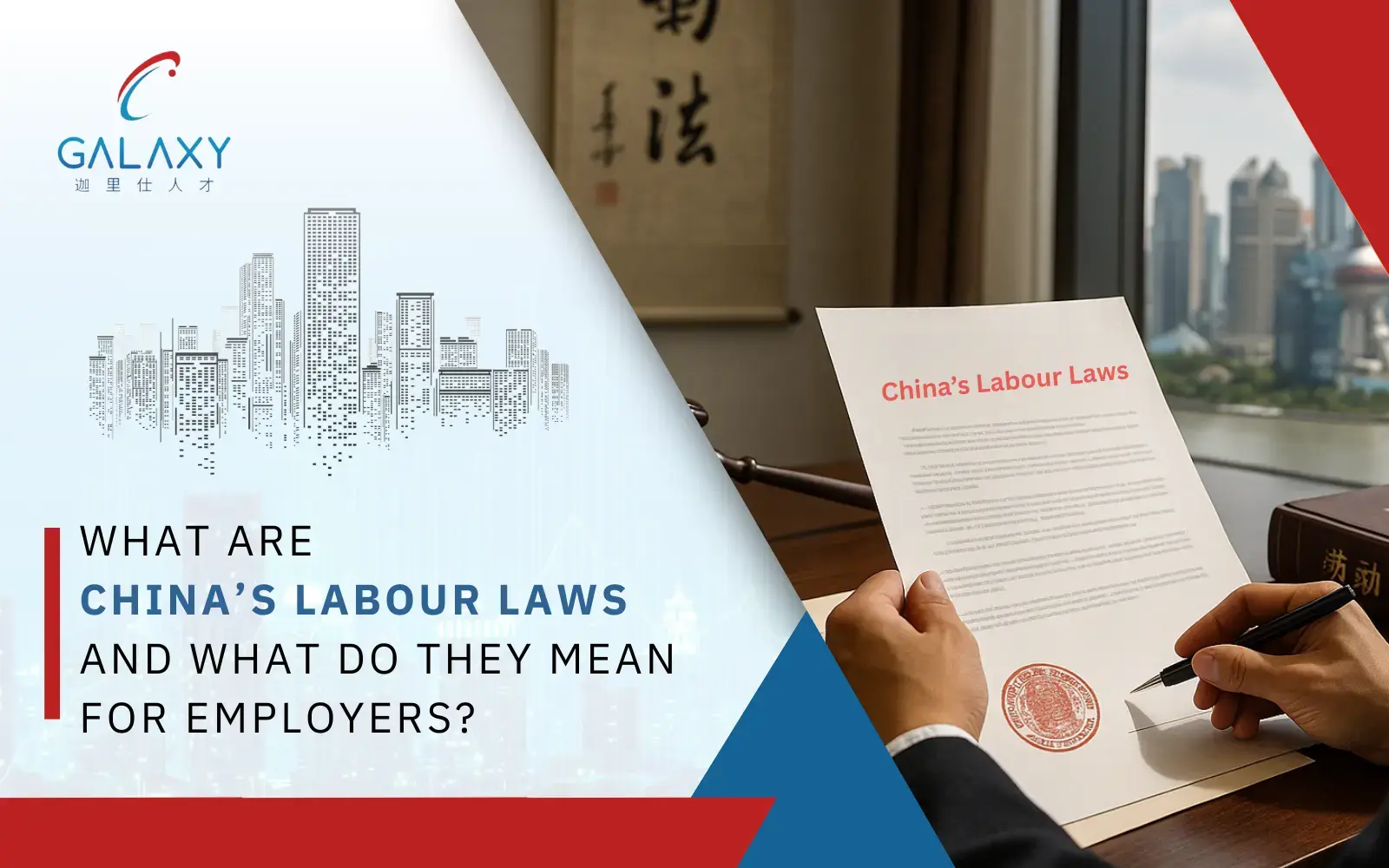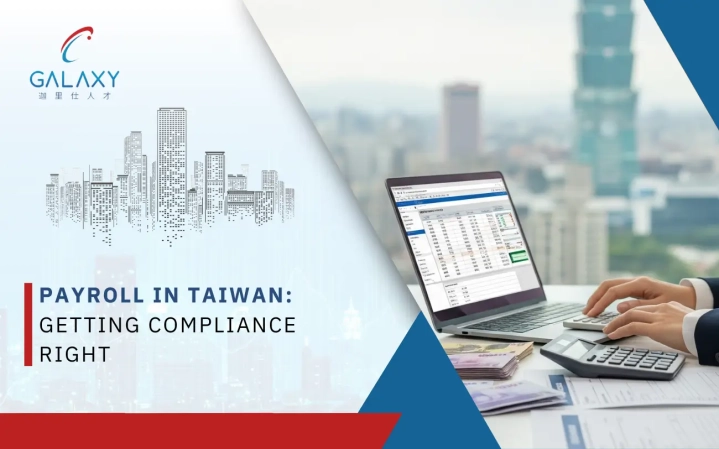What are China’s Labour Laws and What do they Mean for Employers?

In recent years, China has reaffirmed its position as a global powerhouse, not only in manufacturing but also in technology, pharmaceuticals, and logistics. For businesses seeking to tap into this vast economic opportunity, navigating the country’s labour laws is a non-negotiable requirement.
In this blog, we will break down the most critical areas of China’s labour laws, covering everything from employee contracts and social insurance to foreign hiring regulations and legal termination procedures.
If you’re entering the Chinese market for the first time or expanding your operations, this guide from Galaxy Group provides both clarity and strategic direction.
Table Of Content
- Why China’s Labour Laws Matter Now More Than Ever
- How are Labour Regulations Structured and Enforced in China?
- Understanding Employment Contracts under Chinese Labour Law
- Working Conditions in China: Hours, Leave, and Social Insurance
- Minimum Wage in China: National Mandate, Local Control
- What are the Opportunities and Restrictions in Hiring Foreign Workers in China?
- What are the Eligibility Criteria for Foreign Workers?
- Ending Employment the Right Way through Termination Rules
- Top Employer Risks and How to Avoid Them
- Conclusion
Why China’s Labour Laws Matter Now More Than Ever
With its growing role in global commerce, China’s employment law in 2025 remains central to business risk and continuity. Employers are facing increasing scrutiny from regulatory authorities regarding contract issuance, insurance payments, and dismissal procedures. Non-compliance can result in litigation, fines, and reputational harm.
Unlike some jurisdictions that allow greater flexibility in employment relationships, China’s employment law regime is both formal and enforcement-driven. Contracts must be documented in writing, social insurance payments are mandatory, and even minor procedural errors, such as delayed termination notices, can expose employers to costly legal disputes.
For multinational companies, startups, and HR professionals seeking to expand in or hire from China, a thorough understanding of employment law in China is essential. Not only does it minimise compliance risks, but it also enhances employee trust, operational continuity, and long-term sustainability.
Did You Know?
Employers in China must sign a written employment contract within one month of the employee’s start date. Failure to do so can result in double salary penalties.
How are Labour Regulations Structured and Enforced in China?
China’s labour system is underpinned by a comprehensive legal structure, combining national legislation, administrative regulations, judicial interpretations, and local-level implementation.
Employers operating in China must navigate a complex and multifaceted legal environment to remain compliant and avoid costly disputes
China’s Labour Law Hierarchy
NATIONAL LEGISLATION
Labour Law (1994) and Labour Contract Law (2008)
↓
JUDICIAL INTERPRETATIONS
Supreme People’s Court Guidance
↓
ADMINISTRATIVE REGULATIONS
Ministry of Human Resources (MOHRSS)
↓
LOCAL REGULATIONS
Provincial/Municipal Labour Bureaux
1. Labour Law of the People’s Republic of China (1994)
This foundational statute establishes the fundamental rights and obligations of employers and employees, including working hours, rest and leave, remuneration, occupational safety, and social security. It serves as the overarching framework for employment relationships.
2. Labour Contract Law (2008)
More detailed and prescriptive, the Labour Contract Law focuses on individual employment contracts. It mandates the use of written agreements, sets rules for probation, renewal, and termination, and outlines severance pay obligations.
3. Judicial Interpretations by the Supreme People’s Court
In practice, the application of labour laws often hinges on judicial interpretations issued by the Supreme People’s Court. These interpretations guide grey areas, such as dispute resolution, unfair dismissal, or contract loopholes, and are binding on lower courts. For employers, they are crucial for anticipating how courts may enforce or interpret labour provisions.
4. Administrative Regulations and Departmental Rules
Ministries such as the Ministry of Human Resources and Social Security (MOHRSS) and local Human Resources and Social Security Bureaux issue detailed regulations to facilitate implementation. These cover areas such as wage standards, arbitration procedures, insurance contributions, and employment permits for foreign nationals.
5. Local Regulations and Practices
While national laws set the baseline, China’s provincial and municipal governments may introduce their own employment rules, particularly regarding Minimum wage standards, Social insurance contribution rates, Work hour flexibility (e.g., comprehensive or irregular systems)
These local rules must be carefully reviewed, especially by companies operating across multiple provinces, as regional variations can be significant.
Understanding Employment Contracts under Chinese Labour Law
Written employment contracts in China are legally mandatory and form the foundation of every employment relationship.
These are the types of contracts permitted under law:
- Fixed-term contracts – Most common, with defined start and end dates.
- Open-ended contracts – No expiry; required after two consecutive fixed-term renewals or 10 years of service.
- Project-based contracts – Valid until completion of a specified project.
Mandatory Clauses:
All employment contracts in China must include key details such as job responsibilities, working hours and location, salary and benefits, probation period (if any), social insurance contributions, and termination conditions.
Probation Period Limits:
Legally allowed but strictly regulated. Depending on contract length, probation can range from 1 to 6 months, and employees must receive at least 80% of their agreed wage during this period.
Non-Compliance Risks:
Failing to issue a compliant contract may lead to double wage penalties, automatic conversion to open-ended contracts, administrative fines, and limited legal recourse in disputes.
Quick Fact: In China, contracts should always be bilingual (Chinese + English), signed by both parties, and reviewed by local legal counsel to avoid disputes and ensure enforceability.
Understanding how to structure compliant contracts in China is essential; equally important is aligning these with your global policies. Refer to our international contracting guide for a broader perspective
Working Conditions in China: Hours, Leave, and Social Insurance PEZA Investment Framework?
In China, employers are required to comply with statutory standards regarding working hours, leave entitlements, and social insurance contributions.
- The standard work schedule is limited to 8 hours per day and 44 hours per week, with overtime permitted only under approved conditions and requiring additional compensation. Employers in specific industries, such as R&D or senior management, may apply for flexible or comprehensive working hour schemes with government approval.
- Leave entitlements include 5–15 days of paid annual leave (based on years of service), maternity leave of at least 98 days, paternity leave ranging from 7 to 30 days, and sick leave supported by a medical certificate. Marriage and bereavement leave vary by province, so regional policies must be closely monitored.
- Additionally, employers are required to contribute to five social insurance schemes: pension (~20%), medical (~10%), unemployment (~1%), work-related injury (0.5%–2%), and maternity (~1%), as well as a housing fund contribution between 5% and 12%, depending on location. These contributions are crucial to ensuring employee welfare and maintaining full legal compliance.
Minimum Wage in China : National Mandate, Local Control
Unlike some countries with a unified minimum wage system, China adopts a decentralised approach, granting each province and municipality the authority to set and adjust its minimum wage based on local economic conditions, living costs, and labour market dynamics. This means that the minimum wage in China can vary significantly depending on the location of a business.
As of 2025, here are examples of current monthly minimum wage standards in key regions:
| Location | Monthly Minimum Wage (Approx.) |
|---|---|
| Beijing | CNY 2,420 |
| Shanghai | CNY 2,690 |
| Sichuan | CNY 1,820 |
Wages are reviewed annually, and many regions also publish hourly rates. Businesses must stay updated, as non-compliance can lead to back payments, fines, or even licence suspension.
Also Check Out: Minimum Wage Trends in 2025 : A Comprehensive Global Overview.
What are the Opportunities and Restrictions in Hiring Foreign Workers in China?
Engaging foreign job professionals can offer Chinese employers access to global expertise and specialised skills. However, China maintains a tightly regulated framework for foreign employment, and employers are fully accountable for compliance throughout the process. Any breach may result in serious legal and financial consequences, including fines and bans on future hiring.
How to Legally Employ Foreign Nationals?
| 1. Employer Qualification Certificate | Certifies that the company is authorised to hire foreign nationals. |
| 2. Apply for a Z Visa | A work visa issued by a Chinese embassy or consulate before arrival. |
| 3. Register for a Work Permit | Issued by local HR authorities, linked to a specific position and employer. |
| 4. Sign a Written Employment Contract | Must comply with Chinese labour laws and include mandatory clauses. |
| 5. Tax and Social Insurance Enrolment | Required for legal employment and access to local social security systems. |
What are the Eligibility Criteria for Foreign Workers?
To qualify for legal employment in China, foreign candidates must typically meet the following minimum requirements:
- Bachelor’s degree or higher qualification
- At least two years of relevant professional experience
- No criminal record
- Good health (medical check-up required in most cities)
Ending Employment the Right Way through Termination Rules
In China, employee termination is governed by strict statutory protections, and employers must follow formal legal procedures to avoid liability. Unilateral termination is heavily restricted and only permitted under specific conditions outlined in the Labour Contract Law. Failure to comply can result in reinstatement orders, compensation claims, or administrative penalties.
- Permissible Grounds for Termination: Mutual Agreement, Employee Misconduct, Redundancy, Incapacity
- Notice and Severance Requirements: Employers must provide 30 days’ written notice or pay one month’s salary in lieu. Severance pay is calculated as one month’s salary for each full year of service. Periods of six months or longer are considered a whole year; those under six months earn half a month’s salary.
- Termination Prohibitions: Employers cannot terminate employees during pregnancy or maternity leave, while they are receiving certified medical treatment, or without prior arbitration in cases of contested dismissal or contract disputes.
Case Study:
In 2023, a European tech firm operating in Shenzhen was fined over CNY 500,000 for unlawfully dismissing an employee while they were on medical leave. The court ruled that the termination violated China’s Labour Contract Law, ordering full compensation and reinstatement, highlighting the risks of non-compliance for foreign employers.
Top Foreign Employer Risks and How to Avoid Them
For foreign employers operating in China, even well-intentioned HR practices can lead to regulatory breaches if local laws are misunderstood or misapplied. Several common compliance pitfalls can expose companies to fines, legal disputes, and reputational damage. Some common employer risks include
- Misclassification of Employees: Incorrectly categorising workers as contractors to avoid benefits or obligations is a violation.
- Oral or Incomplete Contracts: Failure to issue timely, written agreements can result in double wage penalties and forced open-ended contracts.
- Gaps in Social Insurance Contributions: Inconsistent or regionally non-compliant contributions may trigger audits and back payments.
- Improper Termination Procedures: Dismissing staff without valid cause, required documentation, or due process often results in arbitration losses.
How to avoid these risks?
| Employer Do’s | Employer Don’ts |
|---|---|
| Issue written, bilingual employment contracts within 30 days of hiring. | Don’t rely on verbal agreements—they’re non-compliant and penalised. |
| Stay updated with local wage, leave, and insurance rules. | Don’t assume national rules apply uniformly across all provinces. |
| Contribute accurately and consistently to social insurance and housing funds. | Don’t underreport salaries or skip contributions—this triggers audits. |
| Provide proper termination notice and severance. | Don’t terminate without valid legal grounds or required documentation. |
| Seek local HR/legal guidance for hiring foreign employees. | Don’t bypass visa or permit procedures—this can lead to bans or fines. |
Conclusion
In a regulatory landscape shaped by employment law in China, employers must combine legal compliance with strategic HR planning. Employers must go beyond basic legal awareness to foster a truly compliant, ethical, and culturally attuned workforce. From managing employment contracts and wage standards to navigating foreign hiring and termination protocols, staying aligned with both national laws and local nuances is essential for long-term success.
At Galaxy Group, we support global businesses in navigating regulatory complexity and driving strategic workforce growth across China and the broader APAC region. Whether you’re entering the market, leveraging an EOR (Employer of record) solution for faster entry, or refining your existing HR framework, our team offers expert-led audits, localised insights, and proactive compliance planning to help you build confidently for the future.
Simplify Global Hiring with Our EOR Services
Galaxy Group helps you legally hire talent in China and across Asia—without setting up a local entity.
FAQ’S
How does China regulate employment contracts?
Employment contracts in China must be written and issued within 30 days of the date of hire. They must include job details, salary, working hours, and social insurance. Verbal agreements are invalid and penalised.
What are the rules for employee termination in China?
Termination in China is strictly regulated and allowed only under lawful grounds, such as misconduct or redundancy. A 30-day notice or payment in lieu is mandatory, along with severance and arbitration in cases of dispute.
What are the legal consequences of not issuing a written employment contract in China?
Under employment law in China, failure to provide a written contract within 30 days of hiring obliges the employer to pay double wages starting from the second month. After 12 months, the employee is entitled to an open-ended contract by default.
Can a foreign national work in China without a Z visa and work permit?
No. Foreigners must secure a Z visa, followed by a work permit from the local HR authority, before starting employment. Engaging in foreign jobs in China without the correct documentation is illegal and can lead to fines, deportation, and employer blacklisting.
Are foreign employees in China entitled to social insurance?
Yes, in most cities. Foreign employees working under legal contracts are required to participate in pension, medical, and unemployment insurance, though implementation varies by location. Employers must verify local compliance requirements for social insurance enrolment.
Can Chinese employers terminate at-will?
No, China does not recognise at-will employment. Dismissal must be based on legal grounds, such as employee misconduct or redundancy, and follow prescribed procedures.
How can employers avoid misclassification of employees vs independent contractors in China?
Under China’s labour law, control over work hours, location, and tools typically classifies a worker as an employee, not a contractor. Misclassification to avoid taxes and benefits is a common compliance risk that can lead to back payments, penalties, and legal disputes.




